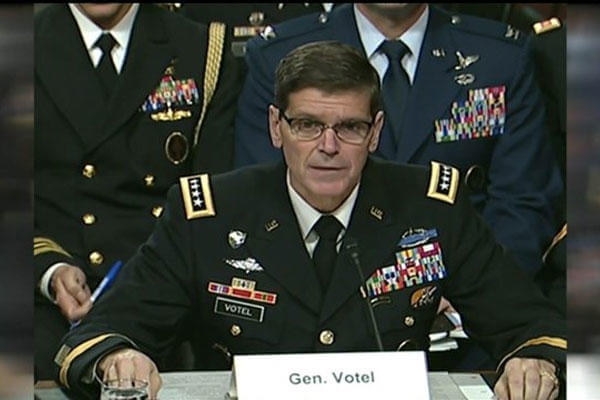The U.S. will likely commit more troops to Iraq to bolster local forces against “specific objectives” in the campaign to retake the last ISIS main stronghold at Mosul, Army Gen. Joseph Votel, commander of U.S. Central Command, said Wednesday.
“We will look to add additional capabilities that are necessary to accomplish our objectives,” Votel said. The extra troops would be in addition to the 560 recently authorized by President Obama to bring the Force Management Level to 4,657. “What we have tried to do is link our request for additional capabilities to specific objectives we’re trying to achieve,” he said.
Votel said the 560 troops authorized last week would be slated for deployment to the airfield called Quyara West about 40 miles southeast of Mosul, which was recently retaken by the Iraqis. The 560 troops have not begun to deploy to the airfield in any significant numbers, but Votel said he expected that to happen shortly.
Votel spoke with Defense Secretary Ashton Carter at a joint news conference following the opening session of a meeting of defense ministers of more than 30 nations in the anti-ISIS coalition at Joint Base Andrews in Maryland on boosting their contributions to the campaign.
“We’re all going to need to do more,” Carter said. “We now have momentum in this fight and clear results on the ground, and today we made the plans and commitments to deliver [ISIS] a lasting defeat.”
The main goal was to accelerate efforts to back the Iraqi Security Forces and the Kurdish Peshmerga forces in retaking Mosul in northeastern Iraq while working with Syrian Arab and Syrian Kurd forces to retake Raqqa, the so-called capital of the Islamic State of Iraq and Syria in eastern Syria.
At the defense ministers meeting, “we agreed on the next plays in our campaign,” which will “culminate in the collapse of ISIL’s control in the cities,” Carter said, using another acronym for ISIS.
Carter declined to go into detail on what the allies and partner nations had agreed to contribute but said France would be returning the aircraft carrier Charles de Gaulle to the Mideast for the third time. He also said that Australia would be expanding its training of Iraqi police and border guards, and Britain would be deploying more trainers and engineers to Iraq.
A key concern of the allies was ensuring that assets were in place to provide for speedy reconstruction, humanitarian aid and the rule of law in areas liberated from ISIS, Carter said. “Most of the conversations were about what happens after the defeat of ISIL,” he said.
-- Richard Sisk can be reached at Richard.Sisk@Military.com.




























